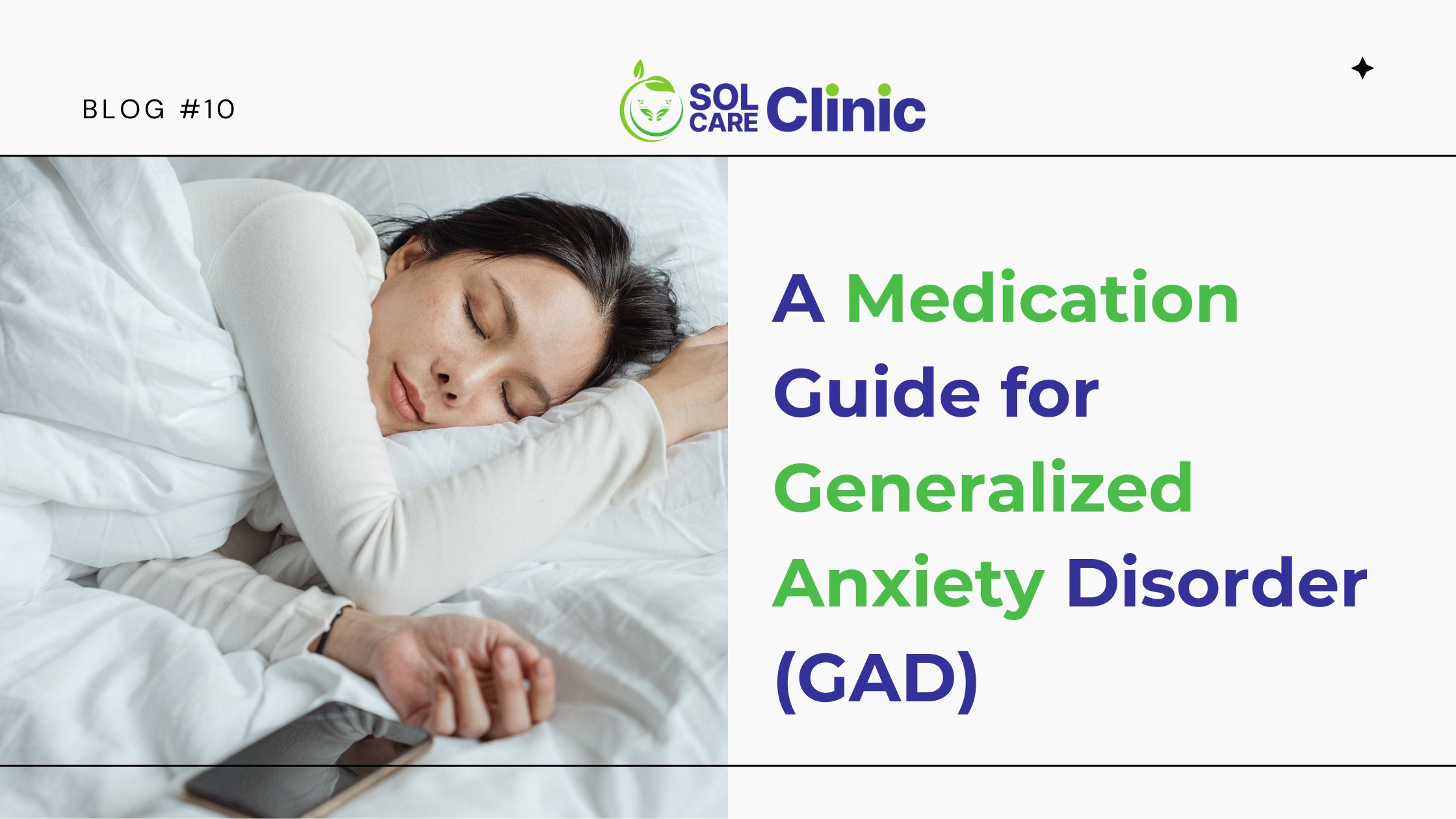Key Insights
- Managing Generalized Anxiety Disorder (GAD) often requires combining medication, therapy, and lifestyle changes.
- Medications like SSRIs, SNRIs, benzodiazepines, and buspirone help balance brain chemicals to reduce anxiety symptoms.
- Effective therapy options include Cognitive Behavioral Therapy (CBT), exposure therapy, and mindfulness-based therapies.
- Choosing the proper medication depends on factors like symptom severity, medical history, and side effects, emphasizing personalized treatment plans.
- Understanding and managing side effects through gradual dose adjustments, medication timing, and healthy lifestyle habits are crucial for overall well-being during treatment.
What is Generalized Anxiety Disorder (GAD) in Healthcare?
Living with Generalized Anxiety Disorder (GAD) can feel like you’re constantly battling an invisible enemy. Ordinary errands become overwhelming, and the tenacious concern can influence your general prosperity.
While treatment and lifestyle changes are fundamental parts of managing it, drugs can likewise play a significant part in finding help. Understanding the medications available, how they work, and their potential incidental effects can enable you to arrive at informed conclusions about your treatment plan.
How Can I Tell If I Have Generalized Anxiety Disorder (GAD)?
First, ensuring a physical health issue doesn’t cause your symptoms is important. Conditions like hyperthyroidism, other endocrine problems, imbalances in calcium levels, low blood sugar, or specific heart issues can all produce anxiety-like symptoms. A few medications can likewise cause uneasiness. Your medical services supplier can assess whether any of these may be the reason for your symptoms.
If no clinical reason is found and your uneasiness appears to be excessive compared to the circumstances you’re managing, you may be determined to have a nervousness problem.
What Are the Treatments for Generalized Anxiety Disorder(GAD)?
Prescriptions can assist with dealing with the side effects of GAD by adjusting the synthetics in the mind that influence temperament and uneasiness. They can diminish the power of side effects and work on the personal satisfaction of those experiencing this condition. Generalized Anxiety Disorder (GAD) can cause day-to-day existence to feel overpowering; however, there are successful medicines accessible to help oversee and diminish side effects. Here are the main treatment options:
What are the Treatments for (GAD)?
- Cognitive Behavioral Therapy (CBT): This is the best treatment. It helps you recognize and change negative ideas, examples, and ways of behaving that add to nervousness.
- Openness Treatment: This includes continuously confronting your feelings of trepidation in a controlled manner to lessen the tension they cause.
- Care Based Treatments: These incorporate procedures like care contemplation and stress-decrease practices that assist you with remaining present and managing your tension.
What are the Prescriptions for GAD?
- Selective Serotonin Reuptake Inhibitors (SSRIs): These are often the main lines of treatment. They work by expanding serotonin levels in the mind, which can further develop temperament and lessen tension.
- Serotonin-Norepinephrine Reuptake Inhibitors (SNRIs): Like SSRIs, these meds additionally assist with expanding serotonin and norepinephrine levels.
- Benzodiazepines: These can quickly help with serious nervousness; however, they are normally recommended for momentary use because of the risk of reliance.
- Buspirone: This prescription is explicitly for uneasiness and can be a choice if SSRIs or SNRIs are not successful or cause too many aftereffects.
Way of life Changes
- Work out: Customary actual work can lessen the side effects of nervousness and work on a general state of mind.
- Solid Eating: Eating a reasonable eating regimen can decidedly influence your emotional well-being.
- Sleep Hygiene: Guaranteeing quality rest is essential for overseeing uneasiness.
- Stress Management Techniques: : Yoga, meditation, and deep breathing exercises can help manage stress.
Support Groups and Education
- Joining a support group like “Sol Care Clinic” for people with GAD can provide comfort and understanding from those who share similar experiences.
- Educating yourself about it can empower you to manage your condition more effectively.
- Instructing yourself about it can enable you to deal with your condition more successfully.
Every individual’s experience is extraordinary, and what works for one individual probably won’t work for another. Working intimately with your medical services supplier to foster a therapy plan custom-fitted to your necessities is significant. With the right mix of treatments, prescriptions, and way of life transforms, overseeing GAD and leading a satisfying life is conceivable.
Selective Serotonin Reuptake Inhibitors (SSRIs)
SSRIs increase serotonin, a neurotransmitter that affects mood, in the brain. They block the reabsorption of serotonin, making more of it available to improve mood and reduce anxiety.
Common SSRIs for GAD
Some commonly prescribed SSRIs for GAD include:
- Escitalopram (Lexapro)
- Paroxetine (Paxil)
- Sertraline (Zoloft)
Alternative and Complementary Treatments
-
Herbal Supplements
Some individuals find relief from anxiety using herbal supplements like valerian root, kava, and chamomile. However, these should be used with caution and under medical supervision.
-
Lifestyle Changes
Incorporating regular exercise, a healthy diet, and sufficient sleep can significantly impact anxiety levels. Mindfulness practices such as meditation and yoga can also be beneficial.
-
Cognitive Behavioral Therapy (CBT)
CBT is a highly effective, evidence-based therapy for GAD. It helps individuals identify and change negative thought patterns and behaviors that contribute to anxiety.
How to Choose the Right Medication for GAD?
Picking the right medicine for generalized Anxiety Disorder (GAD) can be a nuanced interaction, as it relies upon different individual variables and inclinations. Here is an itemized take gander at how to explore this significant choice:
-
The seriousness of Side effects
The power of your uneasiness side effects plays a huge part in deciding the kind of drug. SSRIs or SNRIs are often the best option for gentle to direct tension. For additional serious cases, a blend of medications may be vital.
-
Personal Medical History
Your past medical history, including any history of mental health disorders or substance abuse, will influence the choice of medication. For example, benzodiazepines might be avoided if there’s a history of addiction.
Response to Previous Medications
If you have tried other medications in the past, your response to these can guide future choices. Medicines that are effective or have manageable side effects are often preferred.
-
Side Effects Profile
Different medications have different side effects. Discussing these with your doctor can help you choose a medication with an acceptable side effect profile.
-
Coexisting Conditions
If you have other medical conditions, such as depression, chronic pain, or sleep disorders, certain medications may be preferred because they can address multiple issues simultaneously.
-
Lifestyle and Preferences
Your daily routine, work schedule, and lifestyle preferences are also important. For example, medications that cause drowsiness might not be ideal if you have a demanding job.
-
Open Communication
Be straightforward with your doctor about your side effects, clinical history, and any worries you have about taking drugs. This incorporates talking about any past encounters with prescriptions, both positive and negative.
-
Trial and Error
Finding the right drug frequently includes experimentation. Attempting a few medications or measurements before finding the best routine with the least incidental effects is normal.
-
Combination Therapy/ Treatment
At times, a blend of medications is expected to oversee GAD. Your primary care physician can assist you in deciding on the best blend for your particular needs.
-
Informed Direction
Your physician will give data about every drug choice, including how they work, likely aftereffects, and anticipated results. This data engages you to come to an educated conclusion about your treatment.
Potential Side Effects of Medications
While considering medicines for Generalized Anxiety Disorder, it’s essential to know about possible secondary effects. While these drugs can be exceptionally compelling in overseeing stress, they can likewise accompany undesirable aftereffects that change in seriousness and impact.
Causes and Risk Elements
The specific reason for GAD needs to be clarified. However, it is accepted to be a blend of hereditary, ecological, and mental elements. Risk factors incorporate a family background of uneasiness, constant pressure, and certain character qualities like compulsiveness.
Common Side Effects
Selective Serotonin Reuptake Inhibitors (SSRIs)
- Nausea: Common when starting treatment, often improves over time.
- Cerebral pain: Typically gentle and brief.
- Rest Aggravations: A sleeping disorder or sluggishness can happen.
- Sexual Dysfunction: Diminished charisma or trouble accomplishing climax.
- Weight Gain: A few people might encounter weight changes.
Serotonin-Norepinephrine Reuptake Inhibitors (SNRIs)
- Nausea: Similar to SSRIs, it often subsides with time.
- Dry Mouth: A frequent complaint among users.
- Dizziness: Particularly while standing up rapidly.
- Blockage: Because of diminished gastrointestinal motility.
- Expanded Pulse: Standard checking is significant.
Benzodiazepines
- Sedation: Drowsiness and fatigue are common, especially at higher doses.
- Dependence: Risk of physical and psychological dependence with long-term use.
- Memory Impairment: Short-term memory can be affected.
- Coordination Issues: Increased risk of falls and accidents.
Buspirone
- Dizziness: Common, especially when first starting the medication.
- Headache: Mild to moderate in severity.
- Nervousness: Some individuals may experience increased anxiety initially.
- Gastrointestinal Issues: Nausea and abdominal discomfort.
Tricyclic Antidepressants
- Dry Mouth: Extremely normal, frequently constant.
- Obscured Vision: This can happen, particularly at higher portions.
- Obstruction: Because of anticholinergic impacts.
- Urinary Maintenance: Trouble in peeing.
- Weight Gain: This can be critical for certain people.
Managing Side Effects for GAD
- Starting Low and Going Slow: Starting with a low portion and progressively expanding it can help your body change and limit secondary effects.
- Timing of Medicine: Requiring medicine at a particular time of day can help with specific secondary effects. For instance, taking steadying prescriptions around the evening can help with rest.
- Lifestyle Adjustments: Integrating solid propensities like customary activity, a decent eating regimen, and sufficient hydration can help relieve a few secondary effects.
Concluding
Overseeing Generalized Anxiety Disorder frequently requires a diverse methodology, including drug, treatment, and lifestyle changes. Understanding the various medications available and how they can help can help people make informed decisions about their treatment. If you or somebody you know is battling with GAD, provide proficient assistance and investigate the choices that can prompt a better, more healthy lifestyle.





